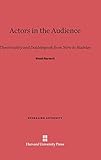Actors in the Audience : Theatricality and Doublespeak from Nero to Hadrian / Shadi Bartsch.
Material type: TextSeries: Revealing Antiquity ; 6Publisher: Cambridge, MA : Harvard University Press, [2013]Copyright date: ©1994Edition: Reprint 2013Description: 1 online resource (309 p.)Content type:
TextSeries: Revealing Antiquity ; 6Publisher: Cambridge, MA : Harvard University Press, [2013]Copyright date: ©1994Edition: Reprint 2013Description: 1 online resource (309 p.)Content type: - 9780674280984
- 9780674280991
- Communication
- Dictateurs dans la littérature
- Dictators in literature
- Dramaturgie
- Empereurs dans la littérature
- Emperors in literature
- Historiography
- Jeu de rôle dans la littérature
- Lateinische Literatur
- Latin literature
- Literature and history
- Misleiding
- Politieke macht
- Rhetoric, Ancient
- Rhétorique ancienne
- Role playing in literature
- Theater audiences
- Theater
- HISTORY / General
- LITERARY CRITICISM / Ancient & Classical
- PERFORMING ARTS / Theater / History & Criticism
- HISTORY / Ancient / Rome
- 875/.0109
- online - DeGruyter
- Issued also in print.
| Item type | Current library | Call number | URL | Status | Notes | Barcode | |
|---|---|---|---|---|---|---|---|
 eBook
eBook
|
Biblioteca "Angelicum" Pont. Univ. S.Tommaso d'Aquino Nuvola online | online - DeGruyter (Browse shelf(Opens below)) | Online access | Not for loan (Accesso limitato) | Accesso per gli utenti autorizzati / Access for authorized users | (dgr)9780674280991 |
Frontmatter -- PREFACE -- CONTENTS -- I. THE EMPEROR‘S AUDIENCE: NERO AND THE THEATRICAL PARADIGM -- 2. THE INVASION OF THE STAGE: NERO TRAGOEDUS -- 3. OPPOSITIONAL INNUENDO: PERFORMANCE, ALLUSION, AND THE AUDIENCE -- 4. PRAISE AND DOUBLESPEAK: TACITUS‘ DIALOGUS AND JUVENAL'S SEVENTH SATIRE -- 5. THE ART OF SINCERITY: PLINY‘S PANEGYRICUS -- EPILOGUE -- APPENDIX 1. THE “CENA TRIMALCHIONIS” AS THEATER -- APPENDIX 2. DID MATERNUS DESTROY VATINIUS THROUGH HIS PLAY? -- APPENDIX 3. [LONGINUS‘] ON THE SUBLIME §44 AND MATERNUS‘ EULOGY -- NOTES -- BIBLIOGRAPHY -- INDEX -- REVEALING ANTIQUITY
restricted access online access with authorization star
http://purl.org/coar/access_right/c_16ec
When Nero took the stage, the audience played along--or else. The drama thus enacted, whether in the theater proper or in the political arena, unfolds in all its rich complexity in Actors in the Audience. This is a book about language, theatricality, and empire--about how the Roman emperor dramatized his rule and how his subordinates in turn staged their response. The focus is on Nero: his performances onstage spurred his contemporaries to reflect on the nature of power and representation, and to make the stage a paradigm for larger questions about the theatricality of power. Through these portrayals by ancient writers, Shadi Bartsch explores what happens to language and representation when all discourse is distorted by the pull of an autocratic authority. Some Roman senators, forced to become actors and dissimulators under the scrutinizing eye of the ruler, portrayed themselves and their class as the victims of regimes that are, for us, redolent of Stalinism. Other writers claimed that doublespeak--saying one thing and meaning two--was the way one could, and did, undo the constraining effects of imperial oppression. Tacitus, Suetonius, and Juvenal all figure in Bartsch's shrewd analysis of historical and literary responses to the brute facts of empire; even the Panegyricus of Pliny the Younger now appears as a reaction against the widespread awareness of dissimulation. Informed by theories of dramaturgy, sociology, new historicism, and cultural criticism, this close reading of literary and historical texts gives us a new perspective on the politics of the Roman empire--and on the languages and representation of power.
Issued also in print.
Mode of access: Internet via World Wide Web.
In English.
Description based on online resource; title from PDF title page (publisher's Web site, viewed 28. Feb 2023)


